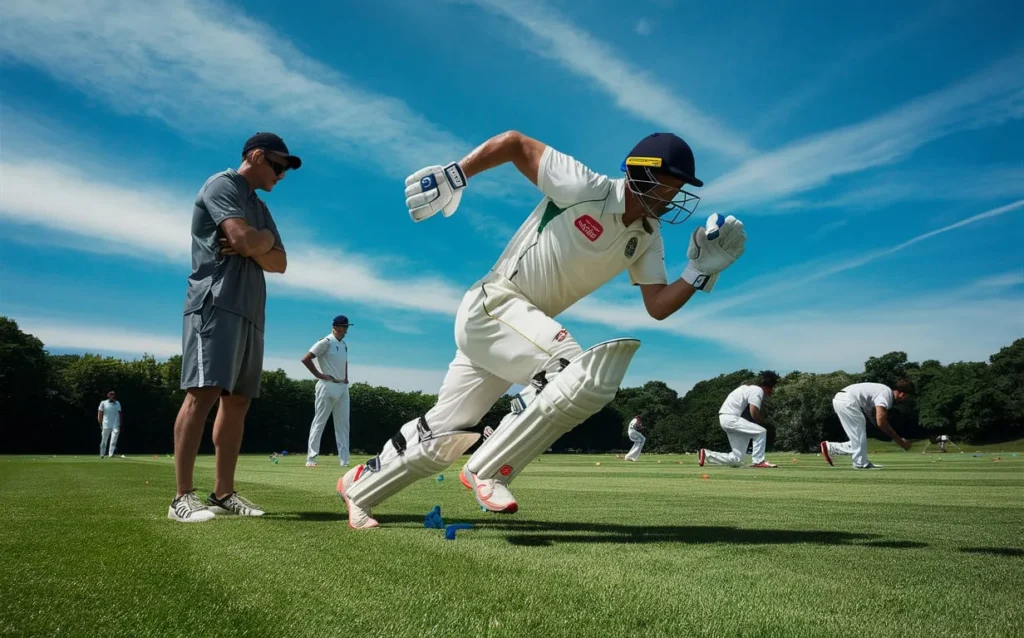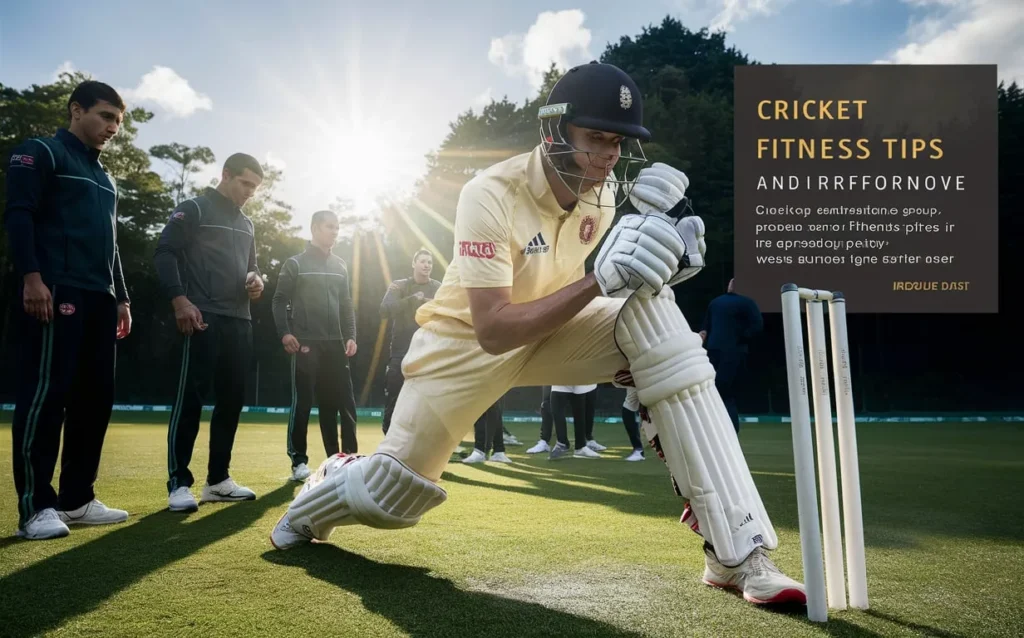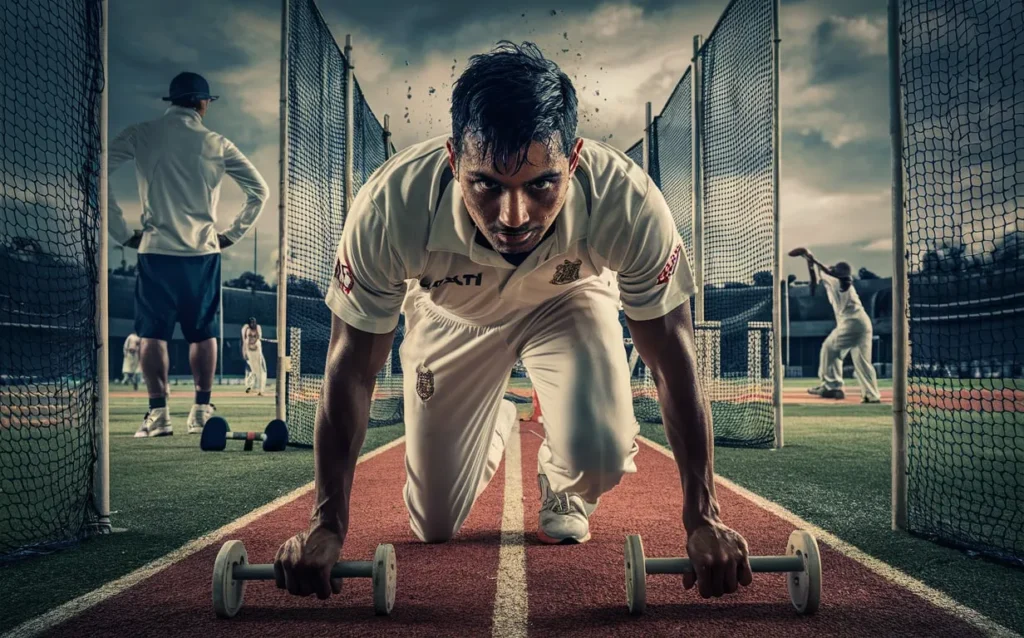Introduction
Cricket Fitness Tips, a game known for its mix of endurance, agility, and mental focus, requires players to maintain top-notch physical fitness. Unlike some other sports, cricket demands a blend of speed, strength, and flexibility to meet the challenges of different roles, whether a player is bowling, batting, or fielding. As the game evolves with faster-paced formats like T20, fitness is more critical than ever. Fitness impacts not just performance but also helps cricketers avoid injuries and prolongs their careers. According to a recent study by the National Cricket Academy (NCA), players with specialized fitness training have a 20% lower injury rate, underscoring the link between fitness and longevity in the sport.
In this article, we’ll explore essential fitness tips tailored for cricketers of all levels, focusing on strength, endurance, flexibility, and injury prevention. Our guide will also include insights on nutrition, recovery, and mental fitness, making it comprehensive for any aspiring or professional cricketer. Additionally, we’ll cover trending techniques and methods in cricket fitness, backed by quantitative data and expert recommendations to ensure you stay ahead in the game.
Strength Training for Cricketers
Strength training is a crucial component for cricketers aiming to enhance their performance on the field. By building muscle strength, cricketers can improve their batting power, bowling speed, and overall agility. A well-structured strength training program focuses on key muscle groups used in cricket, including the legs, core, and upper body. Incorporating exercises like squats, lunges, and resistance training can help develop explosive power and prevent injuries. Additionally, strength training not only boosts physical capabilities but also increases endurance, allowing players to maintain peak performance throughout long matches. Embracing a balanced approach to strength training is essential for cricketers looking to elevate their game.
Importance of Strength Training
Strength is foundational for every role in cricket. Bowlers, for instance, require shoulder and core strength to withstand the high impact of repetitive bowling actions, while batsmen need leg strength for stability and quick movements between the wickets. A lack of strength can lead to injuries, particularly in the lower back, knees, and shoulders, which are common stress points for cricketers.
Key Exercises for Building Cricket-Specific Strength
|
Exercise |
Targeted Muscles |
Sets x Reps |
|---|---|---|
|
Deadlift |
Lower back, hamstrings |
3 x 8 |
|
Squats |
Quads, glutes |
4 x 10 |
|
Pull-Ups |
Lats, biceps |
3 x 12 |
|
Push-Ups |
Chest, shoulders, triceps |
4 x 15 |
|
Plank |
Core |
3 x 1 min hold |
These exercises can be included in a twice-weekly strength workout routine, with 48 hours of rest between sessions to allow muscle recovery.
Progressing with Resistance and Load
Cricketers can gradually increase weights by 10% every 2-3 weeks to avoid overloading and reduce injury risk. A focus on compound exercises, rather than isolation, is recommended to maximize functional strength that directly translates to on-field skills.
Endurance Training for Stamina
Endurance training is crucial for building stamina, which is the ability to sustain prolonged physical or mental effort. This type of training focuses on improving the efficiency of your cardiovascular system, enhancing muscle strength, and increasing overall energy levels. Activities such as long-distance running, cycling, swimming, or even brisk walking can greatly contribute to your endurance. Incorporating interval training and varying your workout intensity can also help to further boost stamina. By consistently engaging in endurance training, you not only enhance your performance in sports but also improve your day-to-day activities, allowing you to enjoy life with more energy and less fatigue.
Building Aerobic and Anaerobic Endurance
The aerobic endurance needed for prolonged games and the anaerobic bursts for sprinting between wickets or quick fielding play both play a critical role in cricket. Studies show that players with high endurance levels exhibit a 15% improvement in on-field stamina, reducing fatigue towards the end of matches.
Recommended Endurance Workouts
- Interval Running: 5 x 400-meter sprints at 80% effort, with 2-minute recovery between sprints.
- High-Intensity Interval Training (HIIT): 20 seconds of intense activity (burpees, jump squats) followed by 40 seconds of rest for 15-20 minutes.
- Long-Distance Running: 2-3 km run at a steady pace twice a week for aerobic endurance.
Maintaining a balanced blend of these exercises will improve both short-burst power and long-lasting stamina.

3. Flexibility and Mobility Exercises
Flexibility and mobility exercises are essential for maintaining and improving the range of motion in your joints and muscles. These exercises help prevent injury, reduce muscle tension, and enhance overall athletic performance. Incorporating activities such as stretching, yoga, and dynamic movements into your routine can significantly enhance your physical capabilities. Regularly practicing these exercises not only aids in recovery but also promotes better posture and alignment, allowing you to move more freely and efficiently in your daily activities and workouts.
Preventing Injuries through Flexibility
Flexibility and mobility help prevent strains and muscle tightness, particularly for bowlers who undergo repetitive shoulder movements. Flexible joints and muscles also contribute to better balance, coordination, and fluid motion in the body.
Key Flexibility Workouts
- Dynamic Warm-Ups: Include lunges, high knees, and arm circles for a complete warm-up routine.
- Static Stretching: Focus on quads, hamstrings, and shoulders post-workout to release tension.
- Foam Rolling: Reduces muscle stiffness and increases blood flow to muscles.
Incorporating these exercises three times per week can reduce injury risk by 30% and promote overall muscle recovery.
4. Cricket-Specific Agility Drills
Agility is essential in cricket, whether for a fielder trying to reach a ball quickly or a batsman dodging short balls. Here are some agility drills that improve reaction time and quickness on the field:
|
Drill |
Equipment Needed |
Duration |
|---|---|---|
|
Ladder Drills |
Agility ladder |
3 x 30 seconds |
|
Cone Drills |
Cones |
4 sets of 20 seconds |
|
Shuttle Runs |
None |
3 x 100 meters |
These drills target fast-twitch muscle fibers, which are essential for sharp, explosive movements on the field.
5. Mental Fitness: Staying Focused Under Pressure
Cricket is as much a mental game as a physical one, where strategy and psychological strength play crucial roles alongside physical skills. Developing mental resilience not only enhances concentration but also sharpens decision-making abilities, particularly in high-stakes situations where the pressure can be overwhelming. Players must learn to manage their emotions, stay focused on their game plan, and adapt quickly to changing circumstances on the field. By honing this mental aspect of their game, cricketers can elevate their performance and maintain composure when it matters most.
Techniques for Mental Fitness
- Visualization: Practicing scenarios in the mind before a game can increase preparedness.
- Mindfulness: Exercises such as deep breathing and meditation reduce stress and improve focus.
- Goal Setting: Setting short-term and long-term goals keeps motivation high and provides a sense of direction.
6. Diet and Nutrition for Optimal Performance
Maintaining a balanced diet and proper nutrition is crucial for achieving optimal performance, whether you’re an athlete or simply looking to improve your overall health. A well-rounded diet rich in essential nutrients, such as carbohydrates, proteins, and healthy fats, can enhance energy levels, support recovery, and boost endurance. Incorporating a variety of fruits and vegetables ensures you receive vital vitamins and minerals that aid in bodily functions. Staying hydrated is equally important, as it directly impacts physical performance and cognitive function. By prioritizing diet and nutrition, you can unlock your full potential and sustain peak performance over time.
Macronutrient Breakdown
For cricketers, maintaining a balanced diet is essential to support training and recovery.
- Carbohydrates (50-60%): For energy, especially on match days.
- Protein (20-25%): For muscle repair and recovery.
- Fats (15-20%): Essential fats aid in prolonged energy release.
Example Meal Plan
|
Meal |
Suggested Food Options |
|---|---|
|
Breakfast |
Oatmeal with berries and a protein shake |
|
Snack |
Greek yogurt with nuts |
|
Lunch |
Grilled chicken, quinoa, and steamed vegetables |
|
Snack |
Banana and almond butter |
|
Dinner |
Salmon, sweet potato, and a mixed greens salad |
7. Hydration Strategies
Proper hydration is crucial for optimal performance, especially during long matches and intense training sessions. Staying well-hydrated helps maintain energy levels, supports concentration, and prevents fatigue, ensuring that athletes can perform at their best. It’s important to drink water regularly before, during, and after physical activity to replenish fluids lost through sweat and keep the body functioning efficiently.
- Water: Aim for 2-3 liters per day.
- Electrolytes: For hot conditions, electrolyte drinks help maintain hydration and prevent cramping.

8. Recovery and Rest
Rest is essential for muscle recovery, preventing burnout, and ensuring that players perform at their best. Adequate rest allows the body to repair tissues, replenish energy stores, and reduce the risk of injuries. Studies indicate that cricketers who get 7-8 hours of sleep recover 25% faster than those with fewer rest hours. This increased recovery rate not only enhances physical performance but also improves mental focus and decision-making on the field. Prioritizing sleep and recovery can significantly impact a player’s overall performance and longevity in the sport.Recovery Techniques
- Sleep: At least 7-8 hours of quality sleep.
- Massage Therapy: Reduces muscle stiffness and enhances circulation.
- Ice Baths: Reduces inflammation and muscle soreness, beneficial after high-intensity matches.
Conclusion
Cricket fitness is a multi-faceted approach that encompasses strength, endurance, flexibility, and mental toughness, all of which are crucial for modern players. As the game of cricket evolves to be faster and more demanding, physical conditioning has transitioned from being an optional part of training to an absolute necessity for players who aspire to excel at the highest levels.
To achieve peak performance, cricketers must engage in targeted exercises that not only build muscle strength but also improve cardiovascular endurance, allowing them to sustain their energy levels throughout long matches. Additionally, flexibility training is essential to prevent injuries and enhance overall mobility on the field, ensuring that players can execute their skills with precision.
Proper nutrition plays a pivotal role in a cricketer’s fitness regime as well. A balanced diet rich in vitamins, minerals, proteins, and carbohydrates fuels the body and aids in recovery after intense training sessions and matches. Hydration is equally important, as it helps maintain optimal performance levels and prevents fatigue.
Moreover, recovery practices, such as stretching, physiotherapy, and adequate rest, are vital for sustaining a player’s physical condition and minimizing the risk of injury. By implementing these comprehensive fitness tips, any cricketer can significantly enhance their performance, allowing them to meet the game’s challenges with the necessary strength, agility, and resilience, while also extending their longevity in the sport they love.
FAQs on Top Cricket Fitness Tips
In case you missed it, here are some valuable resources to enhance your cricket skills and knowledge:
- Bowl Perfect Yorker in Cricket – This guide provides step-by-step instructions on how to master the yorker, one of the most effective bowling techniques that can help you take crucial wickets.
- Understanding Cricket Fielding Positions – Familiarize yourself with various fielding positions to improve your understanding of the game and enhance your strategic play on the field.
- Best Cricket Drills for Footwork – Discover a collection of drills designed to improve your footwork, an essential skill for both batting and bowling, which can significantly impact your performance in matches.
Make sure to check these out to elevate your game!




